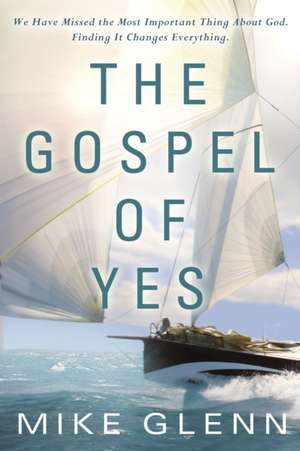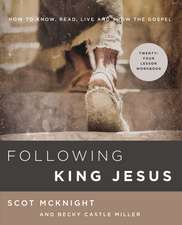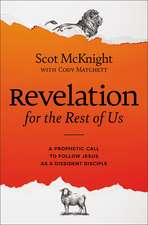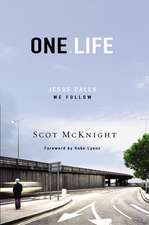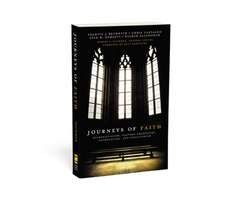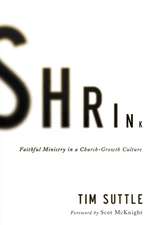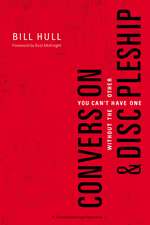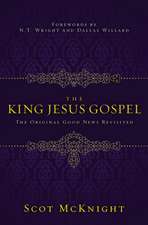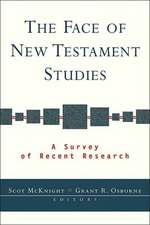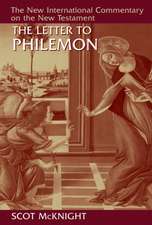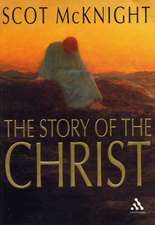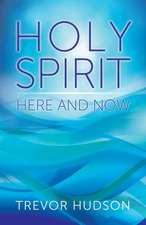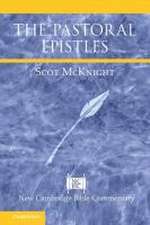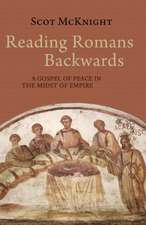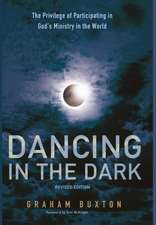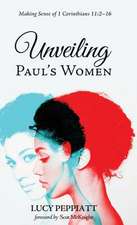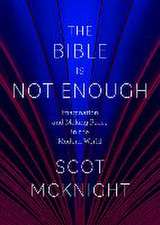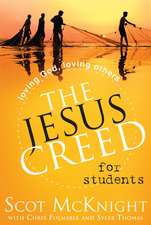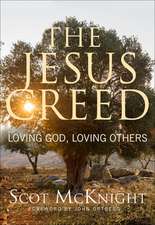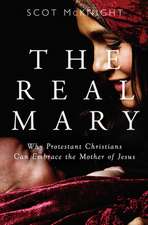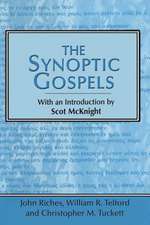The Gospel of Yes: We Have Missed the Most Important Thing about God. Finding It Changes Everything.
Autor Mike Glenn Scot McKnighten Limba Engleză Paperback – 31 mai 2012
What you believe about God affects the way you approach life—often in ways you don’t realize. Are you convinced that God limits you, or liberates you? Is he more interested in correcting you or connecting with you? And when you hit a rough spot and start looking for help, do you believe God is against you or on your side?
In The Gospel of Yes, Mike Glenn reveals God’s most powerful word, which opens our eyes to everything he does. That word is YES. God said “yes” to creating a world for us to live in and “yes” to inviting us into a relationship with him. No matter what we face in life, the best way to live is captured in one word: yes.
When you live in God’s “yes” you find your identity, your true value, and your unique purpose on earth. You can stop trying to be someone else and enjoy being yourself as you join with God in doing the work of his kingdom. When God looks at you he always says “yes.” It’s time to live like you know it.
Includes Discussion Questions for Personal and Group Use.
Preț: 91.82 lei
Nou
17.57€ • 18.79$ • 14.65£
Carte în stoc
Livrare din stoc 07 martie
Specificații
ISBN-10: 0307730476
Pagini: 228
Dimensiuni: 133 x 203 x 18 mm
Greutate: 0.2 kg
Editura: Waterbrook Press
Notă biografică
Extras
For God did not send his Son into the world to condemn the world, but to save the world through him.
—John 3 :17
The lesson that changed my life came out of a crisis. I had been the pastor of my current church for slightly more than a year when I learned a longtime staff member was having an affair. The affair had been going on for nearly three years, but none of us knew about it.
When the news began to leak out, some people in the church questioned if my leadership could be trusted in such a critical matter. I hadn’t been on board long enough to earn their confidence. What’s more, I didn’t know whom I could trust. Who had the ear of the doubters? Whose advice should I listen to? While I didn’t have all the answers, I did know that one way or another, the church and I would get through this. We had no other choice.
And we did get through it. The church stayed together, and by the grace of God, both families affected by the affair stayed intact. By the time the church began to recover, however, I was coming close to losing it. I was wrung out, drained dry, beyond exhaustion. There was nothing left inside me.
I cried. I cried a lot. I prayed a lot. I told God how angry I was at the way things had gone. How could a trusted member of the pastoral staff have done something like that? Some of the church’s members would never get over it. Innocent families were still trying to work through the pain of betrayal and humiliation. Because of the actions of two people, a church and its future ministry were now in doubt.
I wasn’t the only one who was angry. People were angry at me, as well as the minister involved and the person with whom he had the affair. I was one of the few people who knew all the details. What one person hadn’t told me, somebody else had. Sometimes knowing things you don’t want to know about other people is an exhausting burden. This was not the way I had seen my ministry working out, but this was the way it was going.
Sometimes God Shows Up
Still drained and running on empty, I had to prepare for a planning week with the pastoral staff. Leading up to it, I got away to my parents’ house on a lake in north Alabama to pray and work through the plan. As I spread my resource materials across a large table in the kitchen, it hit me that I might not be around to preach the sermons I was about to plan for the coming year. Too much had happened at the church, and when you work through a crisis like this one, sometimes you become a daily reminder of the pain everyone has suffered. Like Moses, some pastors can get you to the River Jordan but not into the Promised Land. Maybe God had brought me to this church to get everyone through the crisis, but now, having gotten them through it, I would have to be replaced by someone else who could lead the church into its future.
I can’t tell you how betrayed I felt. I had thought I was coming to a creative and energetic congregation where I had a chance to make a real difference. Now that dream was being buried in the rubble of lies and betrayal. My anger kept burning. Why should my ministry end prematurely because I had to protect innocent people from the details of all that
had happened?
Everything I had been holding inside for months erupted at the lake house. I came apart. I prayed, but if you had been there, you might not have called it prayer. You would have called it screaming. God had betrayed me. He had kept things from me. Why didn’t he warn me in advance what things were like? Why did he send me there, knowing I’d walk into a firestorm of someone else’s making?
I demanded answers. I really wanted God to come there, to the lake house, and put up an honest fight. I was ready to exhaust myself wrestling with God, just as Jacob had.1 I’d hang in there all night if I had to, and I was willing to walk away with a limp if that was what it took. At that moment, in light of what I was facing back at my church, the limp seemed as if it would be sweet relief.
But God did not come.
The next morning I sat in a rocking chair on the back porch. God hadn’t answered, and I told him I couldn’t go on like this. I made it known that I wasn’t leaving the chair until something changed. I didn’t whisper that prayer out of boldness or even great faith. It was nothing that noble. Either something would change, or I would give in to complete
despair.
I sat on the porch all day.
At dusk suddenly the air felt different. I can’t explain it other than to say I knew God was coming, and he was coming close. Just as suddenly, I was terrified. The God I had been so bold with in demanding that he show up was now approaching. What was I going to do? I was afraid he would blow me off the planet. While moments before I had been defiant in my refusal to move, now I was too scared to move. I found myself holding my breath and bracing for whatever was next.
In the silence I heard two sentences. The first was “Why don’t you let the church relax and be who I made her to be?” The second was “Why don’t you relax and be who I made you to be?” That was it. As fast as the moment had come, it was over.
I began to cry again. Other than the first moment when I knew I was forgiven and accepted by God, when I was seven years old, I had never heard more liberating words. How simple. How profound. How consistent with all that I knew about God and his love for me. If God had indeed created me, then why didn’t I trust how God intended to use me?
Doesn’t it make sense that with God, the Ultimate Designer, form and function would be totally aligned?
I returned to Tennessee to the staff meeting where we planned the sermon schedule. God had asked me why I didn’t just relax and be who he made me to be and why I would try to do anything other than let the church be who he created her to be. I took his words to heart and began talking about how God had created us to work together in ministry.
Our congregation is unique in a lot of ways. We would never be comfortable following fads or trends, no matter how successful they might be somewhere else. The people who had been drawn to our church already knew who God had called us to be. The church had heard its “yes” from God.
Now I needed to ask myself some questions:
“Why me?”
“Why here?”
“Why now?”
Who had God created me to be? Honestly, I didn’t know. I had just endured the most horrendous year of my life, leading a congregation of hurting people through the aftermath of a leader’s sexual infidelity. Why had I been required to suffer the brunt of the reaction to all that?
God knew, and he had given me the freedom to relax and be who he made me to be. I am a firstborn, type A perfectionist. In years past, success for me involved making everyone happy. I lived to please my parents, my teachers, and the people in my congregations. I thrived on those moments when I surpassed the expectations I perceived others had placed on me. It’s no wonder I reached a point of desperation after the crisis.
I was leading others, but I had never thought through my own life. I had never discovered who I was and did not understand the purpose for which I was created. I knew God had a plan for me. But oddly enough, it had not occurred to me that God had created me as a person whose gifts and temperament are in line with his purpose for me. I’d always thought God would grab me, ill suited as I was, and start hammering me into whatever plan he had decided on.
This next thing will sound strange, and as I write this, I admit that I regret it took me so long to gain this insight. It had never occurred to me that God might want me to enjoy my life! How could I have missed that truth?
I’d always been taught to be suspicious if things got too easy or if I felt too happy. Feeling good was suspect, and feeling bad was thought to be evidence that a person was faithfully following God. And I was far from being the only one who believed this. A friend told me that he thought at one time he was supposed to be in the ministry. He felt God’s will had been confirmed when—and these are his exact words—“I was sufficiently miserable.”
Sufficiently miserable. Why do Christians think God would spend time making plans for them that are guaranteed to ruin their lives? Stating it like that makes it sound absurd, I know. But it captures my former assumptions about God and about life. The idea that I might actually like the plan God had for my life had never crossed my mind.
After reaching a point of desperation and demanding that God show up and provide some direction, my eyes were opened. God wanted me to relax. He wanted me to be me, using gifts he had given me. He wanted me to concentrate on doing things I was good at, things that utilized the best of who I was. He wanted me to enjoy my life and my work for him. So I began to pay attention to the way I was wired. What was I created to do, and what had I been trying to do for which I had no real talent or gifts?
Paul reminds us in 1 Corinthians 12 that every believer has been given gifts to serve the body of Christ. He also reminds us that no one person has all the gifts. This way the members of the body learn to synchronize their abilities in the synergy of the Spirit. This was true for me as well. I had some of the gifts but not all of them. So what did that mean for me and for the congregation I led?
I was affirmed in preaching and teaching. I was affirmed in seeing where our church should be going and how we should best respond to changing opportunities. In pastoral care I was passable, but I lacked the clinical training to do much beyond traditional caring ministries. And as for administration, well, I was horrible. One of my friends (and he still is my friend) turned to me in a meeting and said, “Mike, you not only don’t help the church when you attend administrative meetings; you hurt the church.” Yes, that observation stung, but I knew it was true.
We began to rework my job description so I could spend more time doing what I do best. Sure, that process was painful, but in the end it was joyously liberating. Remember, God wants us to relax and be who he made us to be. He wants us to enjoy what we do.
The next thing I did was resign from all the civic groups I had joined. It’s great to be involved in local service organizations, but that doesn’t mean you have to serve on committees or go to all the meetings. I am not good at meetings. I lack the time, and, honestly, I lack the patience. That’s not right or wrong; it’s just me. Since I resigned from the civic groups, everyone is happier. I am, and so are the people who used to be in meetings with me.
Upon first hearing this idea, you might think that finding and living in your “yes” would be limiting, even constricting. Nothing could be further from the truth. In fact, it has been the most liberating experience of my life. I am free to throw my full energy into the things I am gifted to do—and without any guilt or hesitation. I don’t waste time trying to
get better at things I’m not good at. And it no longer bothers me to say, “I’m really not good at that. Someone else should do it.” I am free to be who I was created to be, and I am comfortable with the limits God has lined out for me. Garrison Keillor, in his book Lake Wobegon Days, says it this way:
Some luck lies in not getting what you thought you wanted but getting what you have, which once you have got it you may be smart enough to see is what you would have wanted had you known.2
He’s right, you know. Once you find the “yes” of God, you discover it’s the very thing you would have wanted if only you had been smart enough to ask for it. Fortunately, we don’t have to look hard to find it.
God is eager to show us, but we do need to ask.
Recenzii
“Christians are often known by what they are against rather than what they are for. This stance results from seeing God as a cosmic naysayer, out to coerce our compliance and punish us when we get off track. In The Gospel of Yes, Mike Glenn offers a bold and inspiring corrective. When we start living in the truth of God’s ‘yes’ it changes everything—our view of God, our view of ourselves, and our view of the world. Read it. Embrace it. Share it.”
—Michael Hyatt, chairman of Thomas Nelson Publishers, author of Platform: Get Noticed in a Noisy World
“I talk to people every day who have racked up a huge pile of debt and put their families at risk just so they can live someone else's definition of the good life. But there's a better way to live. In The Gospel of Yes, Mike Glenn shows you God's way of living life from the ‘yes’. Now you can say ‘yes’ to destiny, ‘yes’ to forgiveness, ‘yes’ to God!”
—Dave Ramsey, New York Times best-selling author and nationally syndicated radio host
“God’s ‘yes’ in Jesus Christ leads to our discovering who God made each of us to be. Mike Glenn opens our eyes to the truth that God has said ‘yes’ over us, and it is our simple calling to do God’s ‘yes’ and to be that ‘yes’.”
—Scot McKnight, author of The King Jesus Gospel and One.Life
“This is not a ‘prosperity gospel, name-it-and-claim-it’ book. This is a ‘glorious God, love Him and praise Him’ book. All Christ-followers will be challenged and encouraged by it. Mike Glenn provides a solid biblical foundation for building authentic relationships with God, with others, and with ourselves.”
—Sandra D. Wilson, PhD, seminary professor, spiritual director, and author of Into Abba's Arms and Released from Shame
“Mike Glenn is my pastor, friend, and counselor. He is the right person to author a book about a positive approach to the power and purpose of Jesus Christ. Mike’s emphasis on changing our negative views to those things positive was evident back when I first met him. Now, in The Gospel of Yes, he has given all of us the ‘yes’ that he instilled in me.”
—Brad Paisley, Grammy Award Winning recording artist and Country Music Association Entertainer of the Year
“Too many Christians are living a smaller life than the one God designed for them. They accept unnecessary limitations because they fail to trust God’s ‘yes’. When you listen to God’s ‘yes’, you find your identity and discover your calling. Let Mike Glenn point you toward your destiny as you hear the most powerful word God will ever speak to you.”
—Mark Batterson, author of The Circle Maker, Soulprint, and In a Pit with a Lion on a Snowy Day
“Mike Glenn is that rare incisive, profound thinker who knows how to put the cookies on the lower shelf where the rest of us can enjoy them. The Gospel of Yes is filled with chewy delights you can easily reach. Don’t miss these treats.”
—Jerry B. Jenkins, New York Times best-selling author; owner of the Christian Writers Guild
“Soon after I started The Gospel of Yes, I was no longer reading the message, I was savoring the message. I heard afresh how much God loves me. I heard anew how much He cares for the plans of my life. I heard that God is more interested in telling me ‘yes’ than ‘no’. This book is remarkable. And my reaction at the conclusion of my reading surprised me. I wanted to read it again.”
—Thom S. Rainer, president and CEO of LifeWay Christian Resources
”When we want to accomplish something, we start with a clear destination. We don’t think about the places we don’t want to go, just the place we have determined to reach. The Gospel of Yes is all about living in line with that purpose, with our own ‘yes’. Having watched Mike live out his ‘yes’, and seeing the explosive growth of his church, I am glad he took the time to share his blueprint with the rest of us.”
—Skip Prichard, president and CEO of Ingram Content Group
“This was one of those books where my highlighter wore out before I even finished the introduction. I can't wait to see what will happen to a culture that, up to this point, has believed that God's favorite word is ‘no’. They will be changed by The Gospel of Yes.”
—Jon Acuff, Wall Street Journal bestselling author of Quitter and Stuff Christians Like
Descriere
God would like a word with you
What you believe about God affects the way you approach life—often in ways you don’t realize. Are you convinced that God limits you, or liberates you? Is he more interested in correcting you or connecting with you? And when you hit a rough spot and start looking for help, do you believe God is against you or on your side?
In The Gospel of Yes, Mike Glenn reveals God’s most powerful word, which opens our eyes to everything he does. That word is YES. God said “yes” to creating a world for us to live in and “yes” to inviting us into a relationship with him. No matter what we face in life, the best way to live is captured in one word: yes.
When you live in God’s “yes” you find your identity, your true value, and your unique purpose on earth. You can stop trying to be someone else and enjoy being yourself as you join with God in doing the work of his kingdom. When God looks at you he always says “yes.” It’s time to live like you know it.
Includes Discussion Questions for Personal and Group Use.
